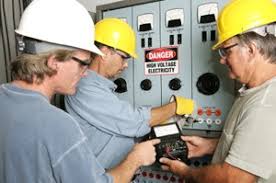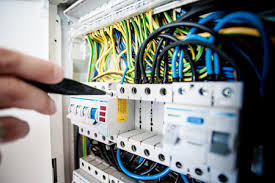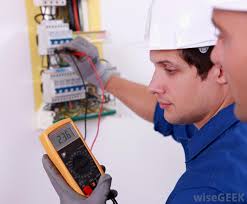What Is an Electrical Home Inspection?
An electrical home inspection provides a thorough examination of your entire electrical system, ensuring all electrical wires, systems, and components (such as appliances) meet legal safety standards. The National Electrical Code (NEC) is the code that all electricians operate under when examining your home, and defines the parameters for minimum standards across the United States. Upon completion of your electrical home inspection, a Mr. Electric® inspector will provide a detailed, prioritized checklist including areas in need of immediate attention, recommendations for improvements, and potential upgrade possibilities.
When Do You Need an Electrical Safety Inspection?
There are specific times when homeowners should schedule an electrical home safety inspection. The Electrical Safety Foundation recommends that homeowners make an appointment for an electrical home inspection at these times:
- When purchasing a home
- When a home is 40 years or older
- When adding an appliance
- When a home has had a major renovation

AMPACITY – the LIMITING FACTOR – Summary
What is the limiting factor that determines the actual electrical service ampacity at a building?
Remember you’re looking for the limiting factor in determining ampacity. Finding the electrical component in this list which has the smallest capacity means that you have found the “weak link in the chain” of components bringing electrical service to the building.
Particularly when inspecting older properties, where there is the chance that someone has upgraded some but not all of the components in this list, there may be an inconsistency such as the installation of a larger electrical panel without upgrading the main disconnect.
- Electrical service entry cable or “SEC” size and amperage rating (we do not generally consider the overhead or service lateral wiring)
- Electric meter (questionable but may assist, especially if the item’s generation, age, and obsolescence can be determined)
- Electric meter base (questionable but may assist, especially if the item’s generation, age, and obsolescence can be determined)
- Main electrical power switch fuse/circuit breaker ampacity
- Electrical panel rated ampacity (and bus design may support only 120V)

Electrical Inspection Checklist
Before finalizing a home purchase, it is common to have a standard home inspection to check for structural problems and electrical, plumbing and mechanical defects. What you may not realize is that the standard inspection addresses surface issues.
A more in-depth inspection by an electrician can uncover electrical problems overlooked in the standard inspection and expose defects that could lead to a house fire.
Here are some areas you should have inspected by a licensed electrician before purchasing a new home:
Electric meter
The electrician should check the electric meter for defects such as insecure installation, broken meter seals and rust at the bottom of the box that could indicate the presence of water. Sometimes water can follow the service entrance cable from the meter box to the main panel.
Electrical wires
Outside wires should be inspected for fraying or other damage. An electrician will also look for unprotected wires anywhere inside the home, especially in attics, basements and crawl spaces. Wires resting on heat ducts or pipes present an unsafe situation and will be reported.
Circuit breaker
The electrical panel houses circuit breakers, which are designed to prevent electrical current from exceeding safe levels. An electrician will check for insufficient clearance, improperly sized circuit breakers, oxidation or corrosion, aluminum branch wiring, overheated components and the presence of moisture. Inspecting these panels can be dangerous, and you should never remove an electrical panel yourself.
GCFI outlets
GFCI outlets should be placed in basements, garages, kitchens and bathrooms. These outlets contain small circuit breakers that shut off when overloaded or if there is a short circuit. An electrician can ensure these outlets are correctly wired and test other outlets in the home for looseness or reversed polarity.
Electrical outlets
An electrician will test all wall switches for reversed polarity and ungrounded circuits, looking out for discolored, loose or damaged switch plates and unsafe wiring.
You should consider joining the electrician during the inspection because it will provide a great opportunity to gain valuable knowledge about your home’s electrical system, and you will be able to verify every item on the list has been inspected.

5 Year Fixed Wire Testing
Most standard workplace environments need an Electrical Installation Condition Report to be produced at least every 5 years. However, there should be regular routine inspections conducted at least annually.
Typical workplaces which require 5 Yearly Fixed Wire Testing include:
- Commercial spaces such as offices and retail outlets
- Hotels and restaurants (excluding spa hotels)
- Schools, colleges and universities
- Laboratories
- Community centres, churches and public houses
- Care homes and hospitals (excluding medical locations)
- Halls of residence, houses of multiple occupancy
How you can help the during a home inspection
Bring any and all red flags about your real estate property to your inspector before he begins, so he’ll keep a sharp lookout for possible problems. If the seller has disclosed damage, give your inspector a heads-up about that, too.
Another smart move is to accompany the home inspector during his rounds. It’s in your best interest to understand this new home, its systems and potential problems. For instance, an inspector can introduce you to electrical panels, air-conditioning and ventilation switches, and shut-off water valves in the plumbing (which the seller may not know how to operate or forget to show you). If the inspector spots a problem, he can show you exactly how a system is malfunctioning, what it means, and maybe a way to fix it. And this info will serve you well not only before you buy, but afterward as well.